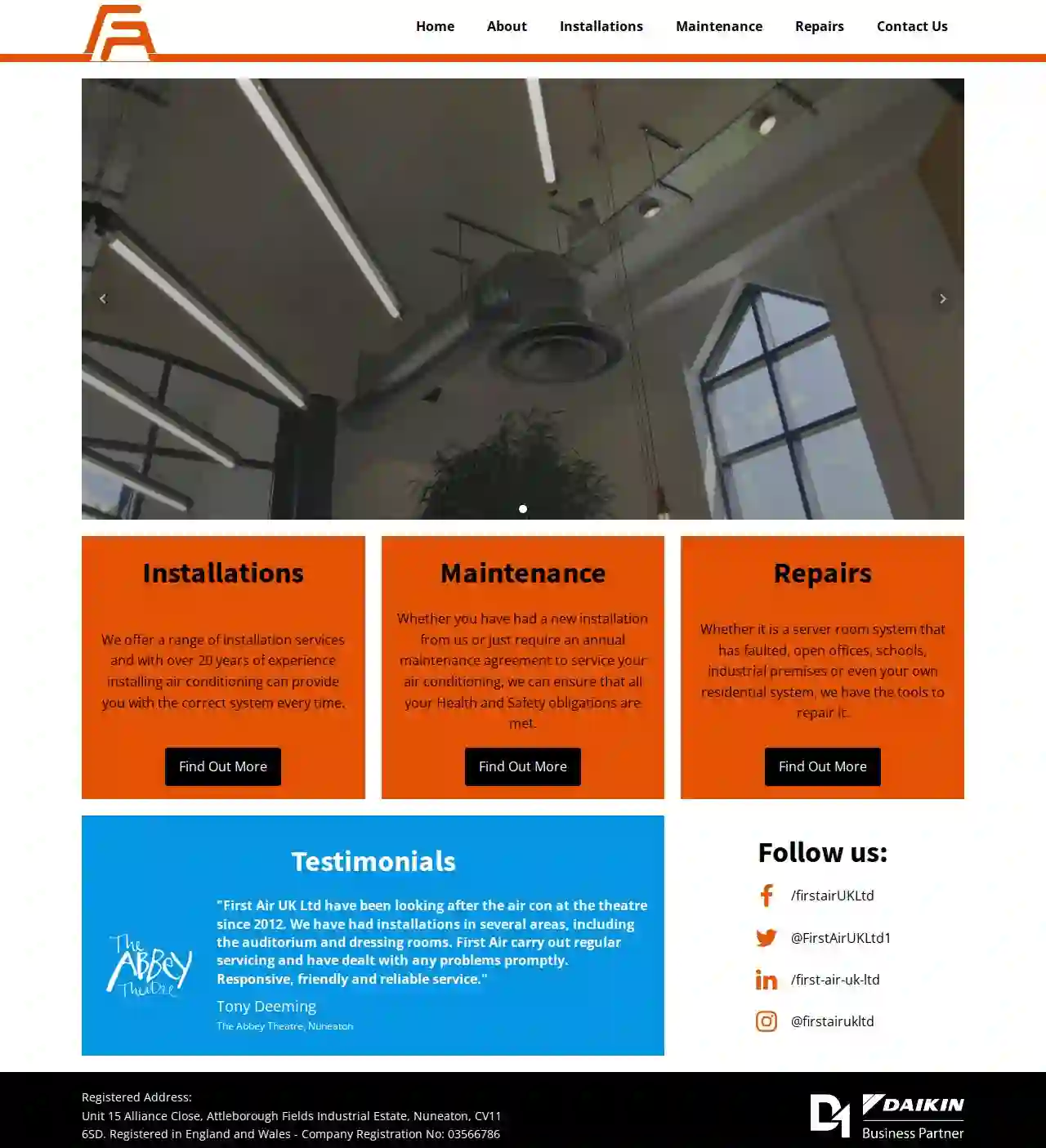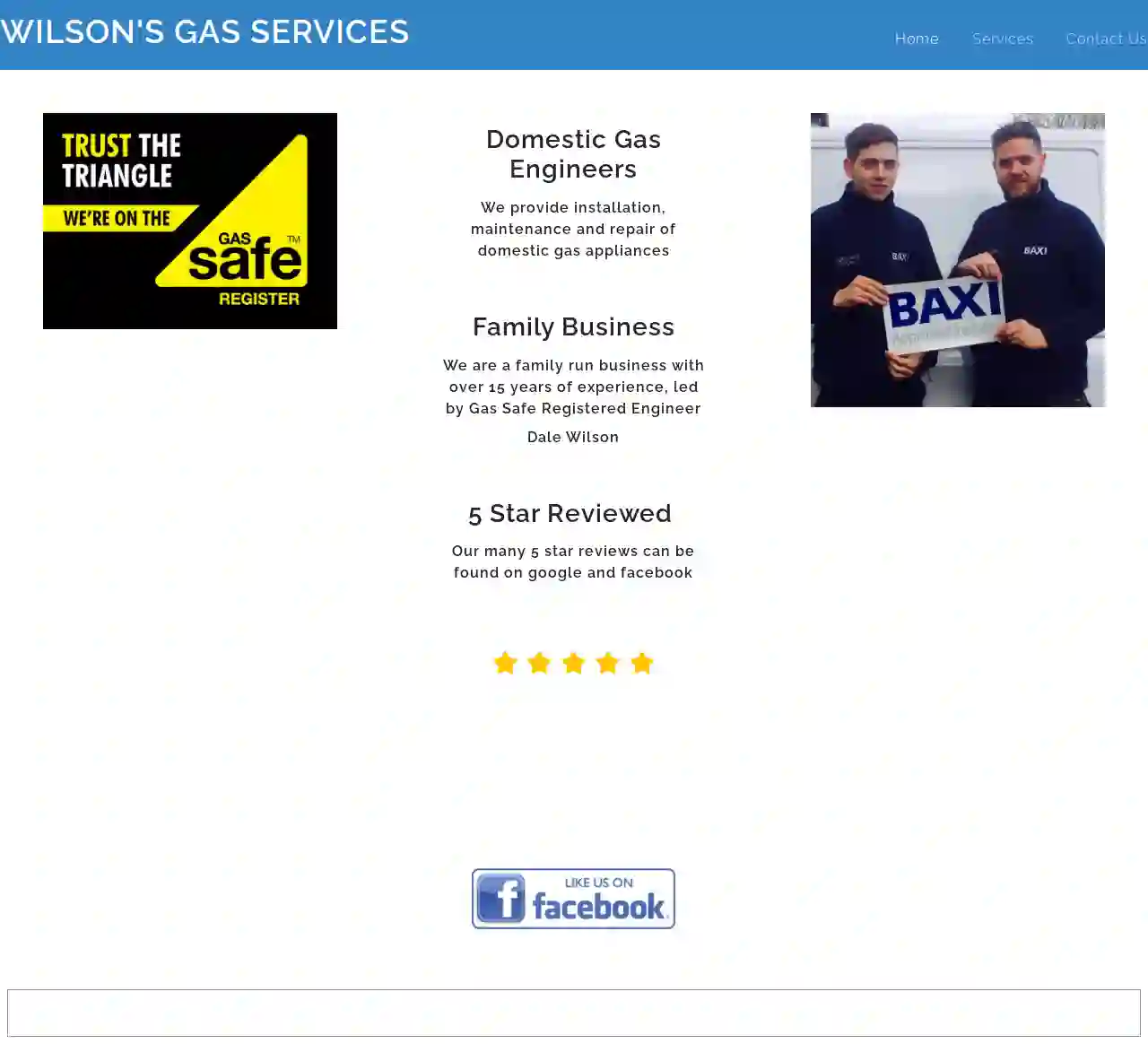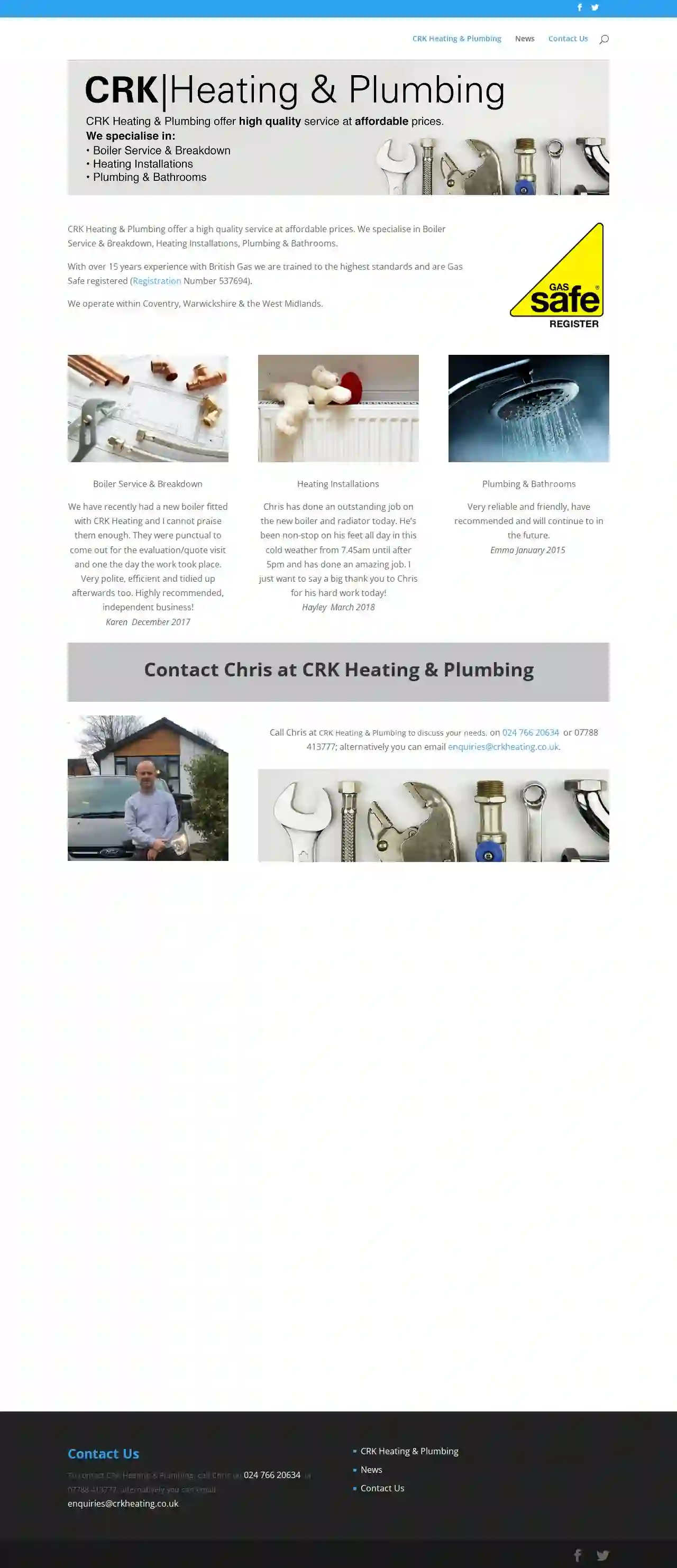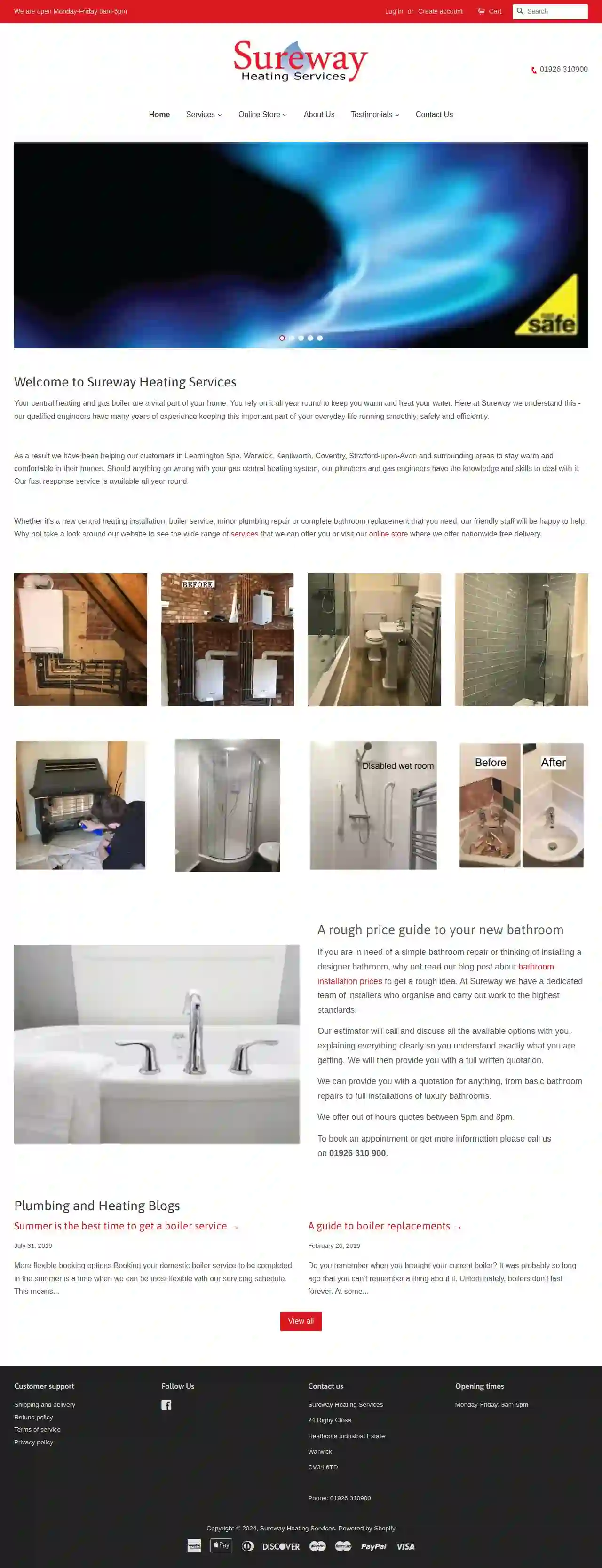Emergency HVAC Polesworth
Best Emergency HVAC Service in Polesworth
Receive 3 FREE After Hours HVAC quotes for your project today! Compare profiles, reviews, accreditations, portfolio, etc... and choose the best deal.

A1 Gas Force Warwick
65 Banquo Approach, Warwick, CV34 6GR, GBA1 Gas Force Warwick is a local business that provides boiler repair, boiler service, and central heating services in Warwick. With 10 years of experience, we are experts in our field and offer a range of services to our customers. Our team of skilled engineers is Gas Safe registered and provides a fast and efficient service to ensure that our customers' heating systems are running smoothly and safely. We also offer a 24-hour emergency service for any plumbing or heating emergencies that may arise. Our customers in Warwick call on us for a plumber for routine, repair, and emergency work. We can carry out installations, replace pipework, fix taps, or any other plumbing task - no job is too big or too small. We also offer a boiler repair service in Warwick, where we can repair or replace your boiler to ensure that it is running efficiently and safely. Our boiler service and repair solutions are tailored to meet the specific needs of our customers, and we offer a range of options to suit different budgets and requirements. We are committed to providing excellent customer service and ensuring that our customers are satisfied with our work. We are available 24/7 for emergency plumbing services and offer a free quote for any work that we do. We are proud to be a local business and are committed to providing a high-quality service to our customers in Warwick.
- Services
- Why Us?
- Accreditations
- Our Team
- Testimonials
- Gallery
Get Quote
Assist Heat
4.33 reviews66 Norman Ave, Nuneaton, CV11 5NY, GBAssist Heat – Emergency Plumber – Nuneaton is a family run plumbing business, providing Nuneaton area with a friendly professional service for all your plumbing and boiler repair requirements. Our 24 hour emergency plumber colchester. With locally based engineers covering these areas, Assist Heat – Emergency Plumber – Nuneaton specialize in all types of Plumbing services including Emergency Plumbing call outs, Boiler Repair, Boiler installation, Boiler servicing and full heating installations. Assist Heat – Emergency Plumber – Nuneaton pride ourselves as being one of the area’s premier 24 hour emergency Plumbing companies. When a problem occurs that requires an immediate response we offer complete solutions including Boiler repairs and waterleak repairs throughout Nuneaton 24 hours a day, 365 days a year. Highly skilled local Plumbers are on standby with fully equipped vans containing all the necessary equipment to carry out any Plumbing service. With our local Nuneaton engineers you know you’re in safe hands. We have had many recommendations through word of mouth. This is due to our policy of putting customer satisfaction as well as safety, above all else. Please contact one of are friendly office staff now to book a appointment.
- Services
- Why Us?
- Accreditations
- Gallery
Get Quote
First Air UK Ltd
51 reviewsUnit 15 Alliance Close, Attleborough Fields Industrial Estate, Nuneaton, CV11 6SD, GBFirst Air UK Ltd is a company with over 20 years of experience in installing, maintaining, and repairing air conditioning systems. We offer a range of installation services and can provide the correct system every time. Our maintenance services ensure that all Health and Safety obligations are met, and our repair services can fix any issues with your air conditioning system. We have worked with various clients, including the Abbey Theatre, and have received positive testimonials for our responsive, friendly, and reliable service.
- Services
- Why Us?
- Testimonials
- Gallery
Get Quote
Baxi Heating Offices
3.3170 reviewsCoventry Road, Warwick, Brooks House, CV34 4LL, GB- Services
- Why Us?
- Accreditations
- Our Team
- Testimonials
- Gallery
Get Quote
Wilson's Gas Services
5111 reviews192 The Long Shoot, Nuneaton, CV11 6JW, GBWe provide installation, maintenance and repair of domestic gas appliances. We are a family run business with over 15 years of experience, led by Gas Safe Registered Engineer Dale Wilson. Our many 5 star reviews can be found on google and facebook.
- Services
- Why Us?
- Our Team
- Gallery
Get Quote
CRK Heating & Plumbing
51 reviewsWarwick, GBCRK Heating & Plumbing offer a high quality service at affordable prices. We specialise in Boiler Service & Breakdown, Heating Installations, Plumbing & Bathrooms. With over 15 years experience with British Gas we are trained to the highest standards and are Gas Safe registered (Registration Number 537694). We operate within Coventry, Warwickshire & the West Midlands.
- Services
- Why Us?
- Accreditations
- Our Team
- Testimonials
- Gallery
Get Quote
AccuTemp Ltd - Air Conditioning Specialists
51 reviewsJusta House 204-206 Holbrook Lane, Coventry, CV6 4DD, GBAccutemp Air Conditioning is a professional air conditioning company based in the heart of England, providing services to businesses throughout the Midlands and surrounding regions. With over 10 years of experience, our team of expert engineers offers a range of services, including air conditioning installation, maintenance, and repair. We pride ourselves on our prompt and efficient service, using only the highest-quality equipment and materials. Our customers can rely on us to provide a hassle-free experience, from initial consultation to installation and beyond. With a 10-year warranty on all our work, you can trust that your air conditioning system is in good hands.
- Services
- Why Us?
- Accreditations
- Our Team
- Testimonials
- Gallery
Get Quote
Stuart Chalmers Gas & Heating
4.843 reviews16 Ridgewood Close, Royal Leamington Spa, CV32 6BW, GBI am proud to provide customers with a full range of high quality boiler installation and maintenance services. Excellent customer service from an engineer you can trust. The business is lead by Stuart Chalmers who has 15 years experience in dealing with a full variety of gas and heating systems having trained with British Gas. Stuart has always been focused on providing outstanding customer care and works only to the highest standards. Stuart Chalmers Gas & Heating provides a reliable and trustworthy service to clients undertaking jobs of all types. BOILER REPLACEMENT I've fitted countless boilers over the years. If you chose to work with me, I will always do the job correctly, without cutting corners, which saves you money in the long run. BOILER SERVICING This is all about keeping you and your family safe. I will check your boiler for safety and that it’s all operating as it should be, keeping you warm when you need it most. BOILER MAINTENANCE As a former British Gas Engineer, I am highly trained as a breakdown engineer meaning I am able to test components and diagnose where the problem lies. GAS SAFETY CHECKS I am Gas Safe registered and qualified to work on Natural Gas and LPG, Boilers, Cookers, Fires and Warm Air Units. Stuart Chalmers Gas & Heating Engineer I trained with British Gas and have over 15 years of relevant and varied industry experience, working with a full range of systems and installations for both domestic applications. As a registered Gas Safe engineer, I'm qualified to install and sign off installations and maintenance jobs to a high level of safety. I pride myself on the high levels of integrity and customer service that my business is founded on. Check out my recent reviews to see what my customers have to say...
- Services
- Why Us?
- Accreditations
- Our Team
- Testimonials
- Gallery
Get Quote
Sureway Heating Services
4.631 reviewsHeathcote Industrial Estate, 24 Rigby Close, Warwick, CV34 6TD, GBWelcome to Sureway Heating Services, a well-established plumbing and heating business in Warwickshire and Coventry. We pride ourselves on our reliability, quality of service, and workmanship. Our comprehensive range of services includes minor plumbing repairs, central heating installations, boiler services, general repairs, bathroom installations, and Landlords Gas Safe Certificates. We employ a great many apprentices, passing on our knowledge and skills to provide the best possible service to our customers. We are proud to offer an all-round professional service, with many letters of thanks from satisfied customers. We are also an online supplier of plumbing, heating, and bathroom products to the trade and general public, offering secure online purchasing and a friendly team of highly trained and experienced staff to assist with your purchase.
- Services
- Why Us?
- Accreditations
- Gallery
Get Quote
Wolseley
52 reviewsWarwick, GBWolseley is the UK's leading plumbing, heating and cooling specialist, with around 560 branches across the UK, including Northern Ireland and the Channel Islands. We're committed to being the service-led partner of choice for trade professionals. Our success is built on growing great relationships with our customers, and that's where you come in. As a prospective member of the Wolseley team, your role will be to help us keep our position as the first choice for our trade and building customers. We became a standalone business at the start of 2021, which gave us the perfect opportunity to define what kind of company we want to be moving forward. Our five core values - Safety, Health & Wellbeing, Exceptional Service, Nurturing Potential, Fairness & Respect and Positive Impact - were developed through our Colleague Forum. They're by our people, for our people. They reinforce our collective identity and give us all something tangible to live and breathe by each and every day. We're a huge operation, involving one of the country's largest fleets of specialist commercial vehicles and backed by cutting-edge warehousing and customer-focused supply chain. We have ambitious plans for the future and we offer a wide range of opportunities for talented people to join us at Wolseley.
- Services
- Why Us?
- Accreditations
- Gallery
Get Quote
Over 12,692+ HVAC Contractors on our directory
Our HVAC pros operate in Polesworth and beyond!
HVACCompaniesHub has curated and vetted the Best HVAC Businesses arround Polesworth. Find a top & trustworthy business today.
Frequently Asked Questions About Emergency HVAC Services
- Turn off the system: Switch off your HVAC system at the thermostat.
- Turn off the power: Locate the circuit breaker for your HVAC system and turn it off.
- Wait: Wait a few minutes for the system to completely power down.
- Restore power: Turn the circuit breaker back on.
- Turn on the system: Switch your HVAC system on at the thermostat.
- Lower Your Thermostat: Set your thermostat to a lower temperature when you are away or asleep. Programmable thermostats automate this process, helping you save money.
- Seal Air Leaks: Seal gaps and cracks around windows, doors, and other openings to prevent heat loss.
- Improve Insulation: Make sure your home is properly insulated.
- Annual Furnace Maintenance: Keep your furnace running efficiently with annual inspections and tune-ups.
- Use Window Coverings: Close curtains or blinds at night to retain heat.
- No heat in freezing weather
- No air conditioning in extreme heat
- Gas leaks
- Carbon monoxide leaks
- Frozen pipes
- Water leaks from HVAC equipment
- Electrical problems with your system
What's the difference between a single-stage and two-stage furnace?
How do I reset my HVAC system?
What is the best way to heat my home efficiently?
What is considered an HVAC emergency?
What's the difference between a single-stage and two-stage furnace?
How do I reset my HVAC system?
- Turn off the system: Switch off your HVAC system at the thermostat.
- Turn off the power: Locate the circuit breaker for your HVAC system and turn it off.
- Wait: Wait a few minutes for the system to completely power down.
- Restore power: Turn the circuit breaker back on.
- Turn on the system: Switch your HVAC system on at the thermostat.
What is the best way to heat my home efficiently?
- Lower Your Thermostat: Set your thermostat to a lower temperature when you are away or asleep. Consider installing a smart thermostat for precise temperature control.
- Seal Air Leaks: Seal gaps and cracks around windows, doors, and other openings to prevent heat loss.
- Improve Insulation: Make sure your home is properly insulated.
- Annual Furnace Maintenance: Keep your furnace running efficiently with annual inspections and tune-ups.
- Use Window Coverings: Close curtains or blinds at night to retain heat.
What is considered an HVAC emergency?
- No heat in freezing weather
- No air conditioning in extreme heat
- Gas leaks
- Carbon monoxide leaks
- Frozen pipes
- Water leaks from HVAC equipment
- Electrical problems with your system